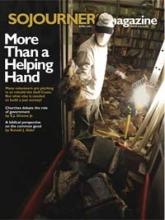This month we look at case studies of four major issues: poverty, the environment, public health, and obstacles to disaster relief. In each of these, the role played by the government is in dispute because of differences in political philosophy and political theology in the churches. As E.J. Dionne Jr.'s article in this issue points out, the debate over the proper role of government has become one of the biggest schisms in the church today. But it doesn't need to be.
There is a biblical role for the state, just as there is for the church. And they are not the same. According to Romans 13, the state is supposed to uphold the rule of law by protecting the innocent and punishing the guilty. It suggests a clear role for the government in ensuring the common good. And when the state fulfills its role properly, it allows the church to do its work in the world. The church must become "bilingual" in speaking the evangelistic message of the kingdom of God to all that will hear and also speaking to the state about its role and responsibilities. Justice, equity, and fairness are biblical concerns for the Christian community and standards to which the government should be held to account.
One could say that people of faith should endorse a "limited" view of government. But this is not the same as the conservative argument for small government, which sometimes cynically translates as an attempt to reduce the ability of the public sector to counter the power of wealth in a society. But neither is it an argument for big government that usurps more and more control and puts in jeopardy both individual rights and countervailing powers to the state.
Read the Full Article
